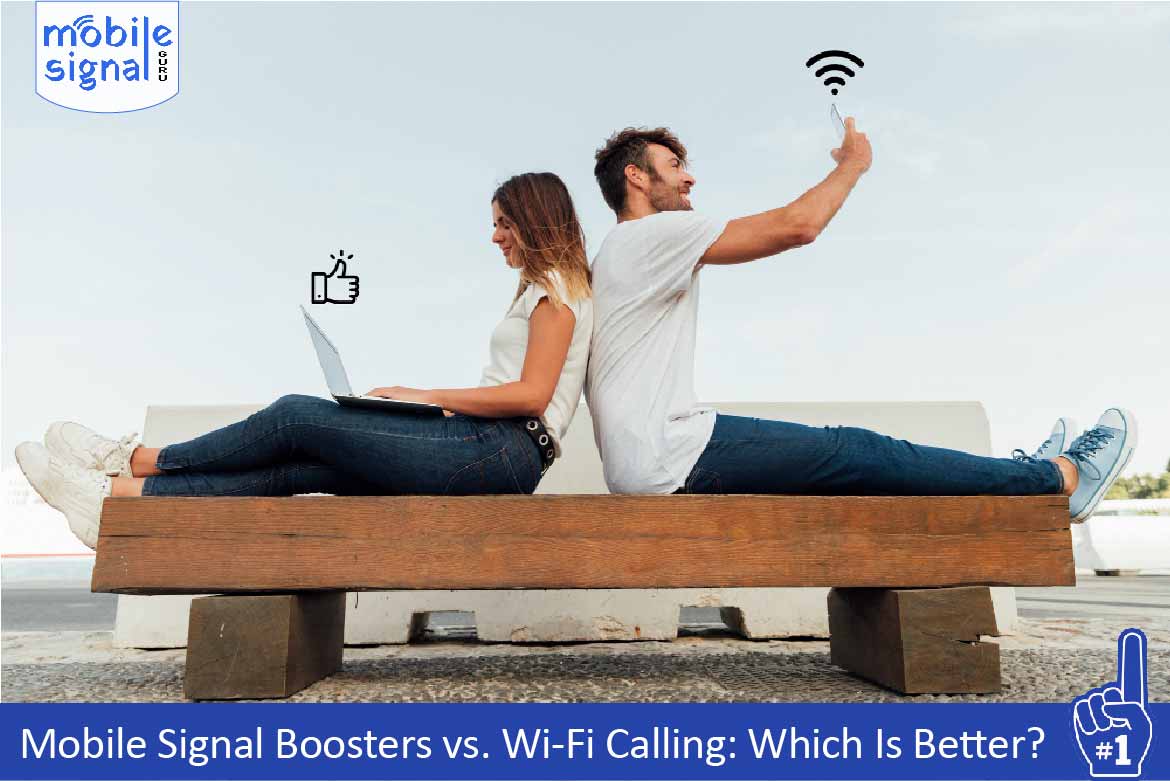When faced with poor mobile signal, two common solutions come to mind: mobile signal boosters and Wi-Fi calling. Both options improve connectivity, but which one is better? The answer depends on your specific needs, location, and how you use your phone. Let’s break down the differences and benefits of Mobile Signal Boosters vs. Wi-Fi Calling to help you decide which is the right choice for you.
What Are Mobile Signal Boosters?
Mobile signal boosters are devices that amplify weak cellular signals. They consist of three main components: an external antenna, a signal amplifier, and an internal antenna. The external antenna captures weak signals from a nearby cell tower, the amplifier boosts the signal, and the internal antenna broadcasts the improved signal throughout your space.
Mobile signal boosters work for all types of networks, including 2G, 3G, 4G, and 5G. They are typically used in homes, offices, vehicles, or boats where cell signal is weak or inconsistent.
Benefits of Mobile Signal Boosters
-
Better Coverage in Remote Areas: If you live in a rural area with spotty cellular coverage, a signal booster can significantly improve your connectivity.
- Works with Multiple Devices: A mobile signal booster strengthens signals for all users in the area. This makes it ideal for large families, offices, or shared spaces.
- Supports All Mobile Carriers: Mobile signal boosters work across all carriers, so you don’t need to switch networks to get a better signal.
-
No Internet Required: Mobile signal boosters rely on cellular signals, not internet. This means they will still function during internet outages.
Drawbacks of Mobile Signal Boosters
-
Upfront Cost: Signal boosters can be expensive, especially for larger areas. However, this is often a one-time investment.
-
Dependent on Existing Signal: Boosters amplify existing signals. If there is no cellular signal to begin with, a booster won’t help.
What Is Wi-Fi Calling?
Wi-Fi calling allows you to make and receive calls over a Wi-Fi network instead of relying on a cellular signal. Most modern smartphones support Wi-Fi calling, and it’s typically a free feature offered by mobile carriers.
Wi-Fi calling is handy in areas with weak cellular signals but strong Wi-Fi networks, such as homes, offices, or cafes.
Benefits of Wi-Fi Calling
-
Easy to Use: Wi-Fi calling is straightforward. You just need to enable it on your phone, and it automatically switches from cellular to Wi-Fi if the signal is weak.
- No Additional Hardware: Wi-Fi calling doesn’t require any extra devices. As long as you have a Wi-Fi connection, you’re ready to go.
- Works in Areas Without Cell Signal: If you’re in a basement or a remote area with no cellular signal but Wi-Fi is available, you can still make calls and send texts.
-
No Cost for Setup: Wi-Fi calling uses your existing Wi-Fi network and doesn’t require any additional costs for installation or maintenance.
Drawbacks of Wi-Fi Calling
-
Dependent on Wi-Fi Network Quality: Wi-Fi calling is only as good as the Wi-Fi connection. A weak Wi-Fi signal can lead to dropped calls or poor call quality.
- Limited to Specific Devices: Not all phones support Wi-Fi calling. If your device is older or not compatible, you may need to upgrade.
-
Doesn’t Work During Internet Outages: Wi-Fi calling is fully dependent on an internet connection, so it won’t work if your Wi-Fi goes down.
Mobile Signal Boosters vs. Wi-Fi Calling: Which Should You Choose?
Choosing between a mobile signal booster and Wi-Fi calling depends on your situation. Here are some factors to consider:
Choose Mobile Signal Boosters If:
- You live in a rural or remote area with poor cellular coverage and unreliable internet service.
- Multiple users need better connectivity for calls, texts, and data.
- You don’t have reliable Wi-Fi but still need strong mobile signals throughout your home or office.
- You want to ensure seamless service during internet outages or when Wi-Fi is unavailable.
Choose Wi-Fi Calling If:
- You have strong Wi-Fi at home or work but weak cellular reception.
- You want an easy, low-cost solution that doesn’t require extra hardware.
- You only need to boost call quality on a few devices rather than covering a large area.
- You don’t mind relying on your Wi-Fi network for calls and texts.
Can You Use Both?
Yes, you can use both mobile signal boosters and Wi-Fi calling to complement each other. In areas where cellular coverage is spotty, a signal booster can improve coverage. In areas where Wi-Fi is strong but cellular signals are weak, Wi-Fi calling is a great backup.
Conclusion
Both mobile signal boosters and Wi-Fi calling have their strengths and weaknesses. If you need reliable coverage for multiple users and devices across a large space, a mobile signal booster is the better choice. However, if you have a strong Wi-Fi network and only need to improve call quality on a few devices, Wi-Fi calling offers a simple and cost-effective solution.
Consider your needs, location, and budget to decide which option is best for you. In some cases, using both may provide the most reliable coverage and call quality. If you have any questions regarding any of our products please contact our support team.
 Australia (AUD)
Australia (AUD) Denmark (DKK)
Denmark (DKK) France (EUR)
France (EUR) Germany (EUR)
Germany (EUR) Ireland (EUR)
Ireland (EUR) Malta (EUR)
Malta (EUR) Netherlands (EUR)
Netherlands (EUR) New Zealand (NZD)
New Zealand (NZD) Norway (NOK)
Norway (NOK) Spain (EUR)
Spain (EUR) Sweden (SEK)
Sweden (SEK) UAE (AED)
UAE (AED) United Kingdom (GBP)
United Kingdom (GBP)
